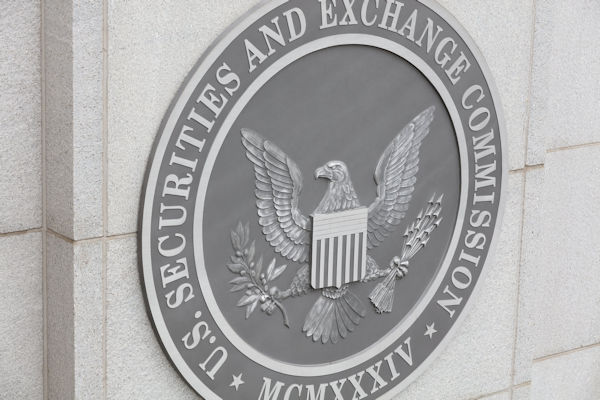SEJournal Online is the digital news magazine of the Society of Environmental Journalists. Learn more about SEJournal Online, including submission, subscription and advertising information.
 |
 |
| The Securities and Exchange Commission is beginning to require disclosure of financial risk related to climate change. For WatchDog, other U.S. and international agencies should demand the same so that journalists can better access the information. Photo: SEC, Flickr Creative Commons. Click to enlarge. |
WatchDog Opinion: Climate Risk Disclosure Guides Journalists, Not Just Investors
EDITOR'S NOTE: This story is one in a series of special reports from SEJournal that looks ahead to key issues in the coming year. Visit the full “2022 Journalists’ Guide to Energy & Environment” special report for more.
 |
By Joseph A. Davis
Before someone buys a stock, they have a right to know how risky it is. Under a fabric of laws going back to the Great Depression, the Securities and Exchange Commission has the power to require publicly traded companies to disclose information about their financial risks. It helps stop fraud and market manipulation.
But only in recent years have environmental liabilities become part of the balance sheet. The SEC is just beginning, for instance, to require disclosure of financial risk related to climate change. Environmental journalists — as well as nervous investors — have a stake in strengthening requirements that companies disclose their climate risks.
The coming year may witness
profound tightening of climate
risk disclosure requirements.
The coming year may witness profound tightening of climate risk disclosure requirements.
Of course, companies face many environmental risks beyond climate. Just ask Bayer, which is trying to settle over $10 billion in liability lawsuits (may require subscription) for the pesticide ingredient in Roundup. Or a company with financial responsibility for helping clean up a Superfund hazardous waste site.
Yet climate change creates many financial risks for many kinds of companies. The climate-related waning in demand for coal could leave some companies bankrupt or unable to profit from their reserves. Climate-induced wildfires can ruin the grapes that vineyards use to make wine. Climate-caused hurricanes can cause expensive oil spills.
Companies don’t always want to disclose these risks. In fact, some companies hide them. Nondisclosure can harm the public (even noninvestors) when pollution is released or jobs are lost.
Just as bad, companies use the arsenal of modern PR techniques to “spin” their environmental posture, making it seem green when it is not.
As of now, though, climate risk disclosure requirements are still weak and poorly enforced. The Biden administration has announced plans to tighten them. Stay tuned.
Biden administration initiatives
Almost from the moment he took office, President Joe Biden made clear that climate action was a top priority, and declared his administration would tackle it with a “whole of government” approach.
That meant not waiting for Congress, and instead encouraging each agency to take action using its own available powers. The Treasury Department and the SEC were part of that plan.
By May 20, Biden had issued a further executive order related to climate risk. It called on federal agencies well beyond the SEC to gather data and analyze climate risks. But the May 20 order strongly prodded the SEC to beef up disclosure requirements for publicly traded companies.
Right now, the SEC is in the middle of doing that. The agency put out a call for public input back in March 2021. According to its regulatory agenda, the SEC expects to propose a rule — really a change to existing rules — in October 2021.
Expect it but don’t hold your breath; there will be lots of lobbying and politicking before it is finalized. SEC may act late this year or early 2022.
The SEC actually went through this
process once before. … There is
hope it may be different this time.
The SEC actually went through this process once before (may require subscription). In 2010, it issued a guidance interpreting existing rules to include disclosure (may require subscription) of climate risks. That version of the rule was somewhat vague and was poorly enforced (may require subscription). There is hope it may be different this time, because some investors want a stronger rule. Even under the old rule, the SEC is pressuring companies for more information.
There are a lot of other initiatives to strengthen reporting of climate financial risks. We are not going to count them all here. You can find plenty of information about the broader effort at the Climate Risk Disclosure Lab, the Commodity Futures Trading Commission, the Financial Stability Board and its Task Force on Climate-Related Financial Disclosures, and this recent account on the SEC from the Harvard Law School Forum on Corporate Governance.
Why it matters for mass media — and the public
We don’t reflect often enough on how easy it is to get on the evening news. … not necessarily as part of the newscast, but via a paid commercial run during the program. We have been seeing a lot of these lately from fossil fuel companies and the lobbying groups that represent them.
Several years ago, the American Petroleum Institute, which represents most of the bigger oil and gas companies, started an ad campaign that presented natural gas (fossil methane) as part of the solution to the world’s climate problem.
That idea itself is fairly contentious. While natural gas is cleaner than coal, it still produces climate-warming carbon dioxide when it burns. And when it leaks, it is a greenhouse gas. At best, the ads are a political argument; at worst, they are untrue.
News programs do contain a hefty
helping of ads that present oil and gas
as the greenest thing since sliced tofu.
Until recently, perhaps, we did not see a lot of climate news on the cable and broadcast networks, where many people get their news. But those news programs do contain a hefty helping of ads that present oil and gas (now recast as gas and oil) as the greenest thing since sliced tofu, and definitely a way for young people to find a brighter future.
You can see a collection of API ads here. API is just the most notable example. Individual oil and gas companies and other fossil fuel trade groups also advertise on their own. Nowadays, with Congress wrangling over a pair of important climate change bills, there is even more fossil fuel advertising on the tube.
Journalists, too, should push for disclosure
Against this backdrop, full and accurate reporting of companies’ climate-related financial risks is even more valuable. Even, we could argue, an essential chance to fact-check the grand and rosy claims in the TV ads.
What can journalists do to help ensure that a full and fair story gets told?
Sure, they can just tell the story — that’s important. But also important would be encouraging the SEC, the Treasury Department and a constellation of international agencies to insist on full disclosure by companies. It’s an important way for journalists (and their audience) to get information.
And again, companies’ stakes in climate change are manifold, and often unique to a particular company or industry. These may include the likelihood that their fossil fuel reserves will become “stranded” assets. But they may also include their vulnerability to storms, flooding, wildfire and even drought.
They may also include liability for cleanups of long-abandoned wells and pipelines. They may even include how well the government (and companies) develop and support additional infrastructure, like electric vehicle charging stations or transmission lines to carry clean electricity to where it is needed.
Journalists hope for “objectivity” — a value too-often used against them. We rarely take positions on public policy. But it is legitimate for journalists to advocate for full disclosure of corporate financial risks related to climate. It is simply an ask for information, which is the quintessence of the journalist’s job.
There should be no hesitation among journalists to call on agencies like the SEC for tough and complete disclosure rules. It is no different, in principle, than filing a Freedom of Information Act request.
Joseph A. Davis is a freelance writer/editor in Washington, D.C. who has been writing about the environment since 1976. He writes SEJournal Online's TipSheet, Reporter's Toolbox and Issue Backgrounder, and curates SEJ's weekday news headlines service EJToday and @EJTodayNews. Davis also directs SEJ's Freedom of Information Project and writes the WatchDog opinion column.
* From the weekly news magazine SEJournal Online, Vol. 6, No. 37. Content from each new issue of SEJournal Online is available to the public via the SEJournal Online main page. Subscribe to the e-newsletter here. And see past issues of the SEJournal archived here.









 Advertisement
Advertisement 


